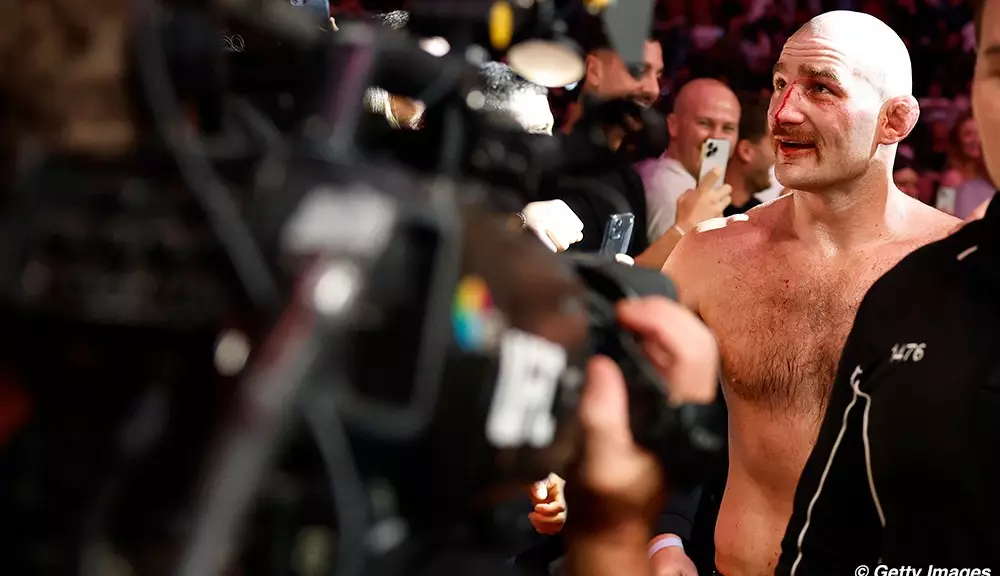The world of mixed martial arts is rife with rivalries and polarizing figures, and few embody this dichotomy quite like Sean Strickland and Belal Muhammad. After a contentious bout at UFC 312 that saw Strickland dominated by Dricus Du Plessis, Muhammad did not hold back on his critique of Strickland’s performance and fight style. This analysis aims to delve deeper into the implications of their words and performances, particularly regarding their respective standings in the UFC hierarchy.
Strickland’s recent fight at UFC 312 marked a pivotal moment in his career, especially following his meteoric rise to championship status after defeating Israel Adesanya in 2023. However, the loss to Du Plessis raised questions about his ability to maintain relevance in a division where top-tier talent is rapidly evolving. Strickland’s history in the welterweight class – where he originally fought from 2015 to 2018 – adds another layer of complexity to the situation. Having returned to middleweight post-recovery from a motorcycle accident, it seemed he was positioned for potential greatness. Unfortunately, the recent defeat bonds him further to the narrative of inconsistency he has crafted throughout his career.
Belal Muhammad, the reigning welterweight champion, has not shied away from sharing his views on Strickland. His comments echo a sentiment that raises questions about Strickland’s tenacity and fighting spirit. Muhammad’s words seamlessly weave together the themes of bravado versus skill, as he noted that Strickland may talk a big game but fails to deliver when it matters most in the octagon. His critique reflects a broader concern in MMA where hype often overshadows actual performance.
Muhammad articulated his disdain in the aftermath of Strickland’s loss, labeling Strickland a “coward” and a “racist little clown.” While the inflammatory nature of these comments may stoke fan interest and engagement, they also blur the lines between personal animosity and professional rivalry. This perspective demonstrates how fighters can leverage personal narratives to define their brand, crafting a persona that resonates with fans and detractors alike.
Strickland’s career trajectory is emblematic of the ups and downs of mixed martial arts. His initial foray into welterweight was marked by a streak of promising performances, of which eight consecutive fights stand out. However, his return to middleweight has been a double-edged sword. On one hand, he achieved the ultimate honor of holding a championship title; on the other, he is now at risk of being categorized as a one-hit wonder in an unforgiving sport.
The world of MMA swiftly disposes of fighters who cannot sustain their results. Following the defeat to Du Plessis, Strickland faces a challenging road ahead. Many fans are questioning whether his style can truly lead him to the upper echelons of the sport. The doubts are amplified by Muhammad’s remarks, suggesting that Strickland lacks the fire to push through setbacks when faced with formidable opponents.
Muhammad’s own trajectory is on the rise, having claimed the welterweight title after a decisive victory over Leon Edwards. His upcoming title defense against Shavkat Rakhmonov could either solidify his reign or present another setback. In contrast, Strickland’s path remains clouded with uncertainty. The prospect of returning to welterweight seems slim, especially with Muhammad emphasizing Strickland’s inefficacy in title contention.
As both fighters carve their paths forward, the rivalry could serve to fuel their narratives. For Muhammad, it reinforces his position in the UFC and offers him a platform to deride a fellow fighter while strengthening his brand. For Strickland, however, it presents an urgent need for reassessment and strategizing, as his time in the limelight may very well be fleeting if he cannot adapt and evolve.
The rivalry between Muhammad and Strickland is set against the backdrop of shifting dynamics within the UFC. As they continue to navigate their careers, it is evident that character and conduct, both in and out of the cage, significantly impact public perception. While Strickland must confront his recent failures, Muhammad seems poised to capitalize on his success and public persona. The unfolding storylines will undoubtedly keep fans engaged, reflecting the complex relationship between rivalry, performance, and the pursuit of greatness in mixed martial arts.

